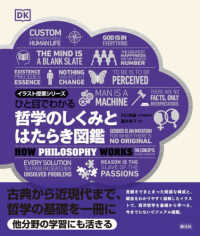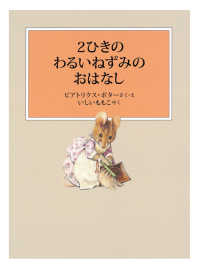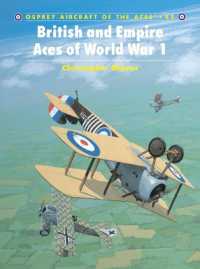基本説明
The third in the series of yearbooks. The objective is to encourage teachers and researchers to include assessment of non-cognitive attributes and to use techniques in addition to paper-and-pencil tests that focus on typical problems.
Full Description
The third in the series of yearbooks by the Association of Mathematics Educators in Singapore, Assessment in the Mathematics Classroom is unique as it addresses a focused theme on mathematics education. The objective is to encourage teachers and researchers to include assessment of non-cognitive attributes and to use techniques in addition to paper-and-pencil tests that focus on typical problems.Several renowned international researchers in the field have published their work in the book. The thirteen chapters of the book illustrate evidence-based practices that school teachers and researchers can experiment in their lessons to bring about meaningful learning outcomes. A recurring theme in most chapters is the widely circulated notions of formative assessment and assessment for learning. The book makes a significant contribution towards assessment in mathematics. It is a good resource for research students and a must-read mathematics educators.
Contents
Introduction: Assessment Matters (K Y Wong & B Kaur); Using a Multi-Dimensional Approach to Understanding to Assess Students' Mathematical Knowledge (D R Thompson & B Kaur); Assessing Problem Solving in the Mathematics Curriculum: A New Approach (T L Toh et al.); Assessing Conceptual Understanding in Mathematics with Concept Mapping (H-Y Jin & K Y Wong); Using Journal Writing to Empower Learning (B Kaur & C M E Chan); Implementing Alternative Assessment in the Lower Primary Mathematics Classroom (K K J Yeo); Open-Ended Tasks and Assessment: The Nettle or the Rose (D J Clarke); Using ICT to Improve Assessment (M van den Heuvel-Panhuizen et al.); The Assessment for, of and as Learning in Mathematics: The Application of SLOA (M M C Mok); Building Bridges Between Large-Scale External Assessment and Mathematics Classrooms: A Japanese Perspective (Y Shimizu); Errors in Mathematics Assessment Items Written by Pre-Service Teachers (J Dindyal); Affective Assessment in the Mathematics Classroom: A Quick Start (E G Tay et al.); Implementing Self-Assessment to Develop Reflective Teaching and Learning in Mathematics (L-H Fan).








